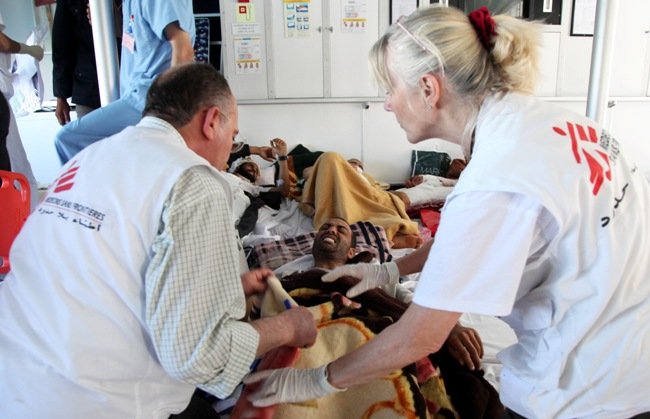
|
| MSF evacuated 99 people, including 64 war-wounded and 35 accompanying persons, by boat from 15 to 16 April from Misrata to Zarzis, Tunisia. Photo: Tristan Pfund / MSF |
ZARZIS- Doctors Without Borders (MSF) evacuated 99 people, including 64 war-wounded and 35 accompanying persons, by boat on Friday 15 April from Misrata to Zarzis, Tunisia. This operation took place two weeks after a first boat evacuation of 71 war-wounded people by the international medical organisation.
This time, the MSF team was able to assess the medical facilities in Misrata, where ongoing fighting has cut-off the population from external assistance, while hospitals and clinics are overwhelmed with casualties.
“For weeks now, health structures have been struggling to cope with the influx of patients. They have been lacking medical equipment and personnel to treat the wounded and the sick suffering from chronic diseases,” said Dr. Morten Rostrup, a MSF doctor who was on the boat. “With the latest heavy bombardments in Misrata, the situation is worsening as hospitals have to discharge patients before their treatment is completed in order to treat the new wounded from fighting. Many injured cannot even access medical facilities without further risking their life.”
In Misrata, the MSF team assess the situation in a camp located near the port where thousands of migrants have taken refuge and are awaiting repatriation.
“What we have seen is that these people live in extremely difficult conditions, lacking proper shelter and food. They are desperate to go back to their home countries,” added Dr. Rostrup.
During this second medical evacuation, the MSF team onboard was composed of seven doctors, six nurses, and one psychologist - including nine Tunisian volunteers. They provided emergency medical care to 64 patients while the boat was sailing back to Tunisia. Among them, 10 are in a critical state, three on mechanical ventilation and another three on oxygen, while another one is suffering from severe anaemia and needs a blood transfusion.
The boat docked in the port of Zarzis early on Saturday. Their transfer to the city of Sfax, which counts a dozen of hospitals and clinics, is being organized by the Tunisian health authorities and the Red Crescent.
This medical evacuation was carried out independently from all the parties involved in the conflict in accordance with MSF’s principles of neutrality and impartiality. While conflict persists inside Libya, MSF is scaling up its assistance to people affected by the violence, regardless of their affiliation or origin and independently of any political considerations.
MSF reiterates its call on all belligerents to allow unhindered access to medical assistance for all Libyans affected by the violence. MSF also calls for the respect of medical facilities, healthcare personnel, and vehicles transporting patients.
MSF in Libya:
During a first medical evacuation by boat on 3 April, MSF evacuated 71 patients from Misrata. Six tons of emergency medical materials were donated to the Libyan medical committee in order to help health facilities cope with the influx of patients. On 21 March, MSF sent a first shipment of surgical kits for 300 wounded to the hospital of Misrata, where large numbers of injured persons and severe shortages of medicine had been reported.
In the eastern city of Benghazi, MSF teams continue to work with the medical committee and to provide support wherever needed, including technical support to the Benghazi central pharmacy in waste management and stock organization. In Al Jalaa hospital, which is both the main trauma hospital and the referral facility for eastern Libya, MSF medical teams are supporting existing hospital staff with nursing care organisation. MSF continues to send medical supplies to Libya, so that they can be dispatched to areas where the ongoing fighting has created the most needs. Since 24 of February, 44 tons of medicine and medical materials, including treatment for burns, have arrived in Benghazi.
In Ras Ajdir, Tunisia, at the border with Libya, MSF teams have been providing psychological support to people fleeing the conflict. They are also working in the transit camp at Choucha, where people are awaiting repatriation or resettlement. From the onset of violence in Libya, MSF’s priority has been to access areas with the largest needs.
FOR MORE INFORMATION, OR TO ARRANGE INTERVIEWS CONTACT:
MSF South Africa Communications Press Mobile: +27 798 722 950 | Email : borrie.lagrange@joburg.msf.org